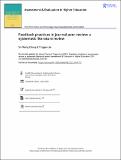Files in this item
Feedback practices in journal peer-review : a systematic literature review
Item metadata
| dc.contributor.author | Chong , SW | |
| dc.contributor.author | Lin, Tingjun | |
| dc.date.accessioned | 2023-01-19T16:30:15Z | |
| dc.date.available | 2023-01-19T16:30:15Z | |
| dc.date.issued | 2024-01-01 | |
| dc.identifier | 282921406 | |
| dc.identifier | df09f639-1a59-43b0-bde9-aa7345fe0919 | |
| dc.identifier | 85146261842 | |
| dc.identifier.citation | Chong , SW & Lin , T 2024 , ' Feedback practices in journal peer-review : a systematic literature review ' , Assessment & Evaluation in Higher Education , vol. 49 , no. 1 . https://doi.org/10.1080/02602938.2022.2164757 | en |
| dc.identifier.issn | 0260-2938 | |
| dc.identifier.other | ORCID: /0000-0002-4519-0544/work/126554393 | |
| dc.identifier.uri | https://hdl.handle.net/10023/26786 | |
| dc.description.abstract | Feedback provided by peer reviewers plays a pivotal role in any journal peer-review model. Peer-review feedback helps authors reconsider their manuscripts in a new light and improve their work before it is published. While there is a wealth of knowledge and empirical evidence focusing on effective feedback practices in educational settings, there is a dearth of research on journal peer-review feedback, especially in some academic disciplines including the social sciences and education. To better under-stand ‘good’ and ‘bad’ peer-review feedback practices across academic disciplines, we conducted a systematic literature review, informed by grounded theory, that aimed to identify the feedback features and factors that exert an impact on quality of peer-review feedback. Findings from 20 publications indicate a list of good and bad features of peer-review feedback pertaining to content, language, tone, structure and timeliness. We also identified a number of internal and external factors that influence how peer reviewers provide feedback such as academics’ expertise, lan-guage skills, motivation and seniority, as well as external influences such as anonymity in peer-review, and interactions between editors and peer reviewers. Implications for researching and practising peer-review are discussed. | |
| dc.format.extent | 12 | |
| dc.format.extent | 1177770 | |
| dc.language.iso | eng | |
| dc.relation.ispartof | Assessment & Evaluation in Higher Education | en |
| dc.subject | Peer-review | en |
| dc.subject | Journals | en |
| dc.subject | Research evaluation | en |
| dc.subject | Feedback | en |
| dc.subject | Reviewers | en |
| dc.subject | Systematic literature review | en |
| dc.subject | LB2300 Higher Education | en |
| dc.subject | DOAE | en |
| dc.subject | MCC | en |
| dc.subject.lcc | LB2300 | en |
| dc.title | Feedback practices in journal peer-review : a systematic literature review | en |
| dc.type | Journal article | en |
| dc.contributor.institution | University of St Andrews. International Education Institute | en |
| dc.identifier.doi | 10.1080/02602938.2022.2164757 | |
| dc.description.status | Peer reviewed | en |
This item appears in the following Collection(s)
Items in the St Andrews Research Repository are protected by copyright, with all rights reserved, unless otherwise indicated.

